Artificial intelligence chatbots are evolving rapidly, and Claude by Anthropic has quickly become one of the most recognized names in the AI space. With the launch of Claude Opus 4.1, it now offers better context handling, coding assistance, and improved long-form writing capabilities.
But despite its popularity, Claude isn’t the perfect tool for everyone. Its knowledge base is limited, it doesn’t provide real-time web access, and some users feel that its tone is too formal compared to other AI companions.
That’s why many users are exploring alternatives—chatbots and AI assistants that may fit better depending on whether you need research support, content writing, coding help, or casual conversations.
To help you choose, here are the 15+ best Claude AI alternatives for 2025, complete with their features, pricing, and ideal use cases.
1. Pi – Your Personal AI Companion

Best For: Personalized conversations & real-time answers
Pricing: Free
Overview:
Developed by Inflection AI, Pi is designed to act more like a friend than a traditional chatbot. Instead of sounding like a research assistant, Pi delivers warm, engaging, and conversational responses. It runs on the Inflection-2.5 model, supports multi-turn dialogue, and is always connected to the web for real-time information.
If Claude feels like a serious professional, Pi feels more like a casual coffee chat—lighthearted, personal, and easy to engage with. However, unlike Claude, it struggles with technical queries, long research tasks, and complex writing projects.
Pros:
- Free to use, no subscription required
- Real-time internet access
- Friendly and informal communication style
- Works across multiple devices with memory for past chats
Cons:
- Not ideal for long research papers or in-depth content
- Limited coding and technical writing abilities
2. HuggingChat – Open-Source Flexibility
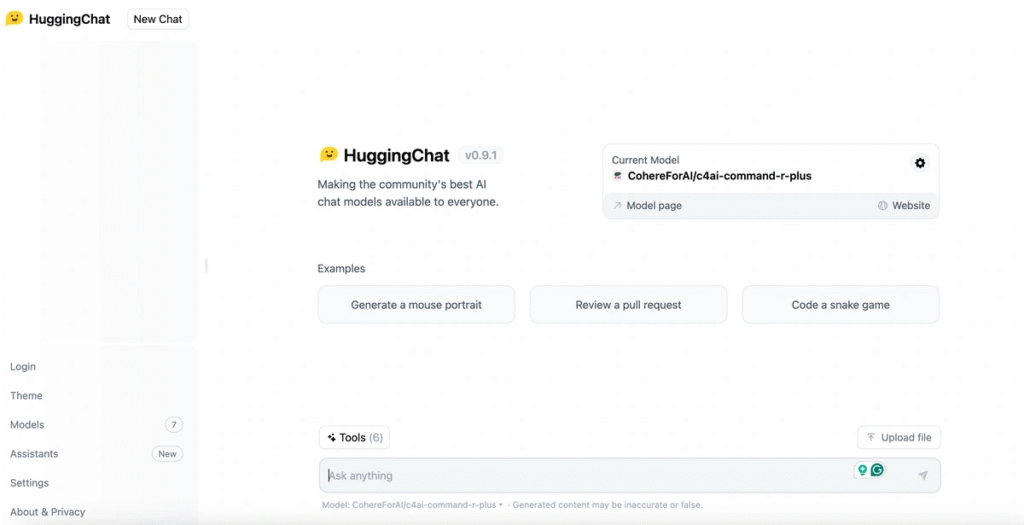
Best For: Developers & customization enthusiasts
Pricing: Free
Overview:
HuggingChat, created by Hugging Face, is an open-source AI chatbot that runs on multiple models, including Open Assistant, Mistral 7B, and Llama 3. Unlike Claude, which runs on proprietary technology, HuggingChat gives users the freedom to experiment with different models, build custom assistants, and integrate AI into apps.
While Claude may outperform HuggingChat in terms of fluency and accuracy, HuggingChat’s flexibility makes it a favorite among developers, hobbyists, and researchers. Plus, it provides real-time internet access, something Claude still lacks.
Pros:
- 100% free and open-source
- Supports multiple languages
- Access to community-driven AI assistants
- Internet-connected for live updates
Cons:
- More prone to factual errors (“hallucinations”)
- Not as polished for professional writing as Claude
3. ChatGPT – The Most Popular Alternative
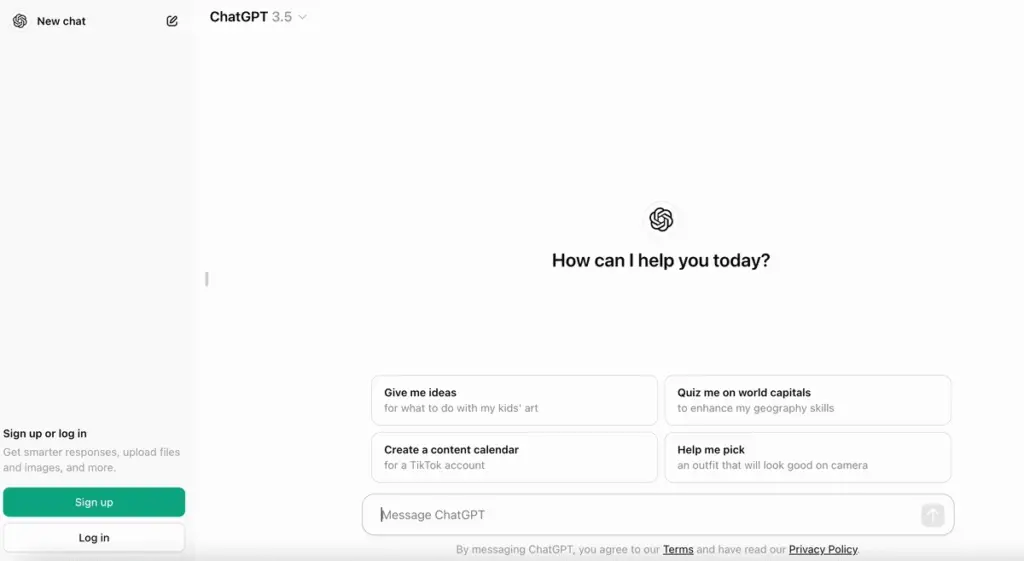
Best For: Content creation, research, and coding
Pricing: Free (Pro plan at $20/month for GPT-5)
Overview:
When it comes to mainstream adoption, ChatGPT by OpenAI is Claude’s biggest rival. Powered by models like GPT-3.5, GPT-4, and GPT-5, it’s widely used for writing, brainstorming, translation, customer support, and programming help.
Unlike Claude, ChatGPT Plus users can access real-time web browsing, multimodal capabilities (text + images), and custom GPTs. This makes it more versatile for users who need a multi-purpose AI assistant.
Pros:
- Multiple AI models available
- Web-connected for updated knowledge
- Handles creative + technical writing with ease
- Supports images, code, and advanced reasoning
Cons:
- Free version has limited features and older models
- Requires a Pro subscription for full functionality
4. Perplexity AI – The Research Powerhouse
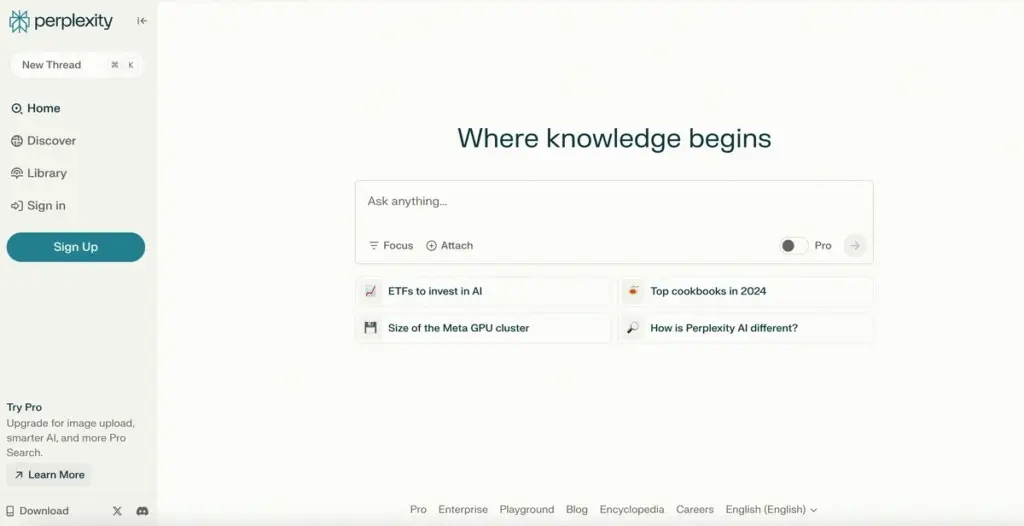
Best For: Fact-based research & citations
Pricing: Free (Pro plan $20/month)
Overview:
If your main concern is accuracy and reliable information, Perplexity AI is the tool to consider. Unlike Claude, which generates responses without showing sources, Perplexity works more like a conversational search engine. It provides footnotes, citations, and links with every answer, making it a go-to for students, researchers, and professionals.
Perplexity supports multiple models (GPT-4, GPT-5, Claude, etc.) and ensures that each response is backed by real-time web searches. While it may not be as creative as Claude or ChatGPT, its strength lies in precision and trustworthiness.
Pros:
- Provides citations & links for transparency
- Always connected to the internet
- Supports multiple AI models
- Great for academic and professional research
Cons:
- Less creative for storytelling or marketing copy
- Free version limits advanced searches
5. Google Gemini
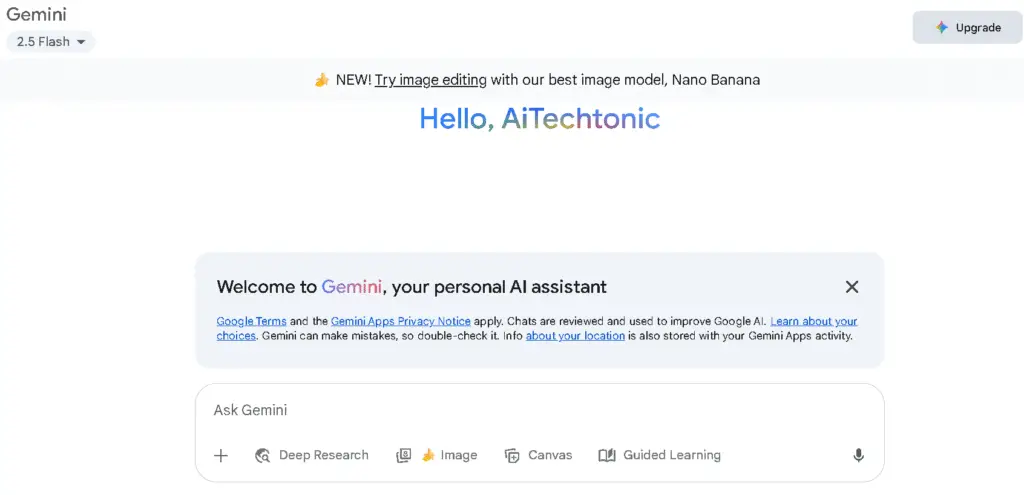
Overview
- Model Type: Proprietary (Ultra, Pro, Flash, Nano)
- Launched: March 21, 2023
- Created by: Google DeepMind
- Web Access: Yes
- Core Use: Research, content creation, large input processing
Gemini is Google’s flagship multimodal AI that combines text, images, audio, video, and even code interpretation into a single system. Its most recent update, the Pro 1.5 model, introduced a massive two-million-token context window, making it one of the best tools for handling lengthy research or technical writing projects.
Where Claude shines in creative natural language and nuanced dialogue, Gemini excels in speed, real-time accuracy, and seamless integration. Premium users can access Gemini directly inside Google products like Docs, Sheets, and Gmail, offering a productivity boost that Claude can’t match.
Pros
- Multimodal AI (text, images, audio, video, code)
- Handles over 200 languages
- Generous free tier for beginners
- Direct integration with Google Workspace apps
Cons
- Occasional inaccuracies or irrelevant answers
- Less natural conversational style compared to Claude
Pricing
Gemini is free for basic use with limited queries. For advanced access, Gemini Advanced costs $19.99/month, bundled with extra Google One storage and premium integrations across the Google suite.
6. Jasper
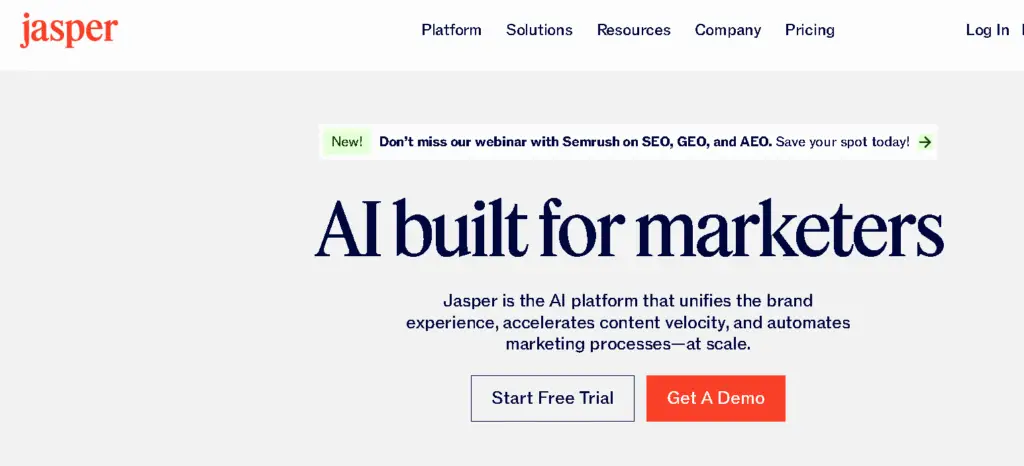
Overview
- Model Type: Mix of GPT-4, Claude 3 Opus, and proprietary models
- Launched: January 2021
- Created by: Jasper Technologies
- Web Access: Partial (JasperChat is offline)
- Core Use: Blog writing, sales copy, and branded content
Jasper is one of the earliest AI writing assistants designed specifically for marketers, content creators, and businesses. Unlike Claude, which is a general-purpose chatbot, Jasper focuses on content marketing workflows. It can generate blog posts, ad copy, landing pages, email campaigns, and more.
The platform provides two main tools: Jasper’s AI Writer for long-form articles and Jasper Chat for shorter, conversational tasks. What makes Jasper unique is its ability to maintain brand voice and style across outputs, powered by a customizable knowledge base and over 500 pre-built templates for different industries.
Pros
- Works in 25+ languages
- Maintains consistent brand voice and writing tone
- Integrates with Grammarly and SurferSEO
- Library of 500+ prompts and templates
Cons
- No permanent free plan
- Outputs can sometimes feel generic compared to Claude
Pricing
- Creator Plan: $49/month – 1 seat, Jasper Chat, and 1 brand voice
- Pro Plan: $69/month – 1 seat (+$59/mo for each extra seat), 3 brand voices, knowledge assets, and campaign features
7. Poe by Quora
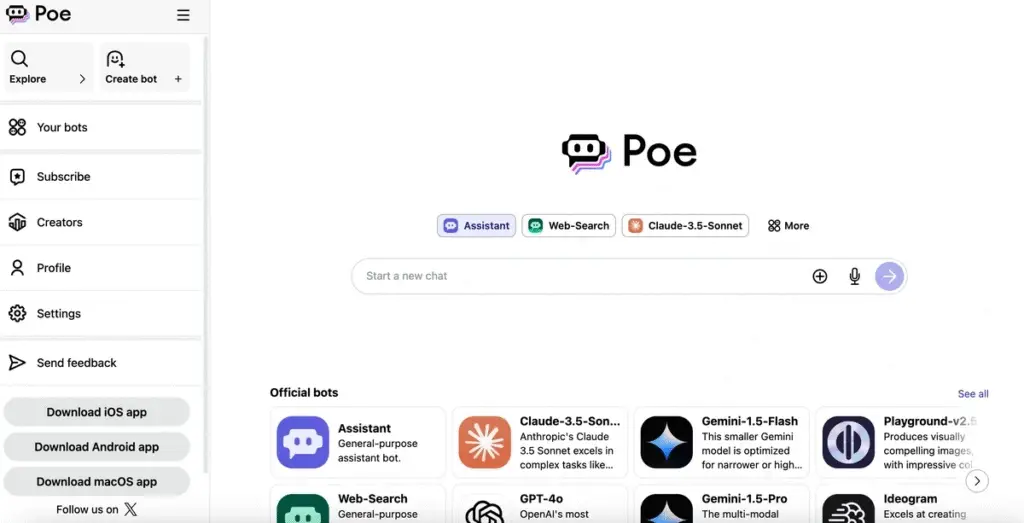
Overview
- Model Type: Claude 3.5, Gemini 1.5, GPT-4o, and more
- Launched: February 6, 2023
- Created by: Quora
- Web Access: Yes
- Core Use: Multi-bot conversational platform
Poe is Quora’s AI hub that gives users access to multiple AI models on one platform, including Claude, ChatGPT, and Gemini. Unlike Claude, which only uses Anthropic’s models, Poe lets you switch between different bots, or even build and share your own custom chatbots.
It supports multi-bot conversations, meaning you can interact with several models at once for comparisons or brainstorming. While performance varies depending on the model chosen, Poe’s strength lies in its flexibility and wide cross-platform support (web, iOS, Android).
Pros
- Access to multiple leading AI models in one app
- Ability to create and share custom bots
- Available across mobile and web platforms
Cons
- Inconsistent results across different models
- Still in beta, with occasional bugs
Pricing
- Free Plan: 150 messages or 3,000 points/month
- Premium Plan: $19.99/month – 5,000 interactions and priority access
- Annual Plan: $199.99/year (~$16.67/month) for unlimited usage
8. Microsoft Copilot
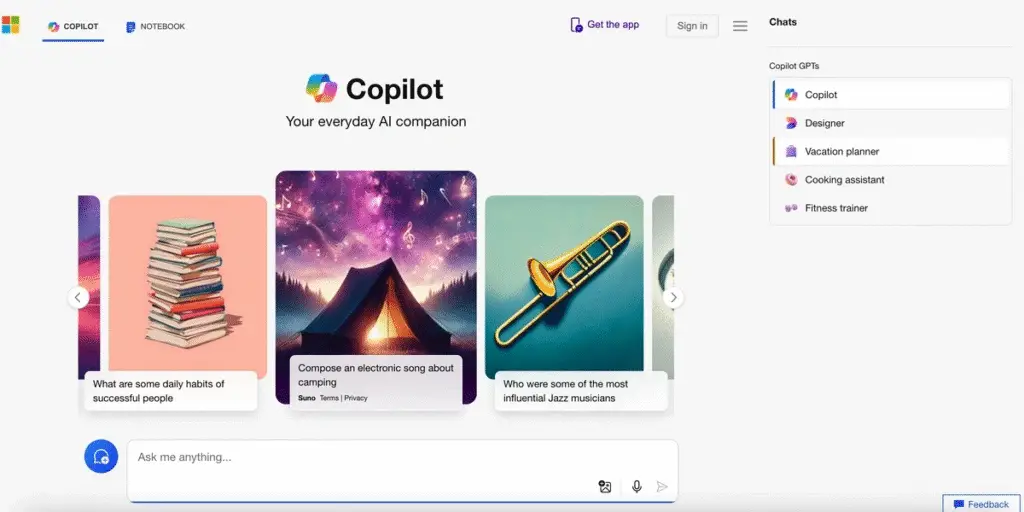
Overview
- Model Type: GPT-4o, GPT-4, GPT-4 Turbo, GPT-5
- Launched: February 22, 2023
- Created by: Microsoft
- Web Access: Yes (via Bing)
- Core Use: Productivity, automation, and research
Microsoft Copilot is more than just a chatbot—it’s a productivity companion built into Microsoft 365 tools like Word, Excel, PowerPoint, Outlook, and Teams. Unlike Claude, which is primarily a conversational AI, Copilot helps automate day-to-day business tasks such as writing emails, analyzing spreadsheets, summarizing reports, and drafting presentations.
Since it’s connected to Bing, Copilot delivers real-time web results. This makes it more factually reliable than Claude, which relies on its last training cut-off.
Pros
- Deep integration with Microsoft 365 apps
- Strong data analysis and business automation features
- Real-time web access via Bing
- Boosts productivity across workflows
Cons
- Limited functionality outside Microsoft ecosystem
- Customization options are fewer than Claude
Pricing
- Free Plan: Basic web chatbot
- Copilot Pro: $20/month for GPT-4 Turbo, advanced features, image generation, and Microsoft 365 integration
9. Writesonic
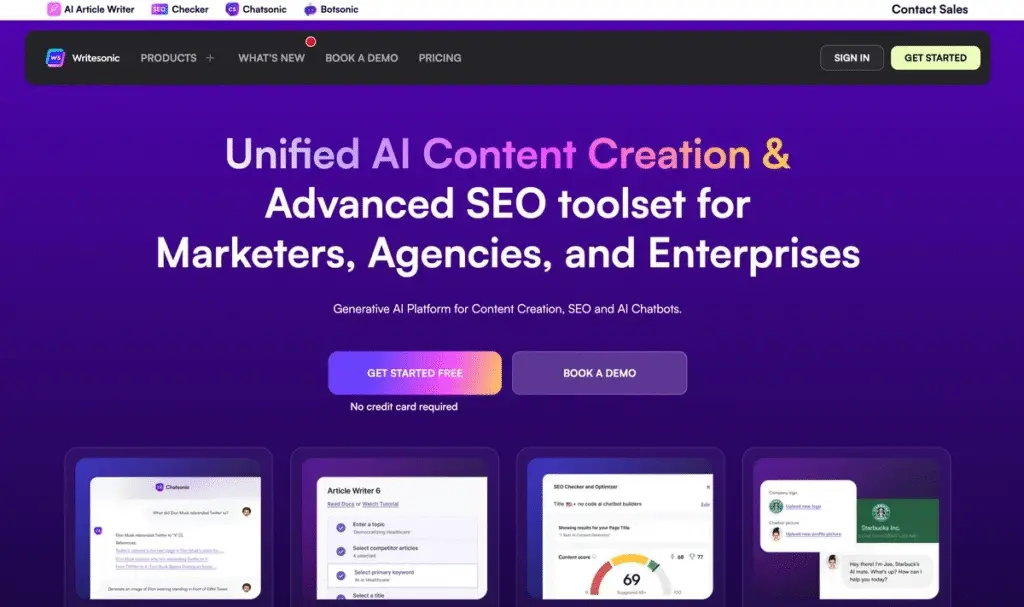
Overview
- Model Type: GPT-3.5, GPT-4
- Launched: January 2021
- Created by: Writesonic Inc.
- Web Access: Yes (via Chatsonic + Google Search)
- Core Use: SEO-focused long-form and marketing content
Writesonic is a dedicated AI writing platform tailored for SEO-friendly content creation. While Claude is an all-purpose chatbot, Writesonic specializes in generating blog posts, social media content, ad copy, and product descriptions.
Its premium tool, Chatsonic, combines conversational AI with real-time Google Search integration, giving users up-to-date answers along with creative text. Writesonic also offers tools like a paraphraser, summarizer, and text expander, making it a strong choice for digital marketers.
Pros
- Supports 25+ languages
- Google Search integration for live data
- Image generation via Stable Diffusion and DALL-E
- Available as a Chrome extension
Cons
- Outputs may feel repetitive or less natural compared to Claude
- More focused on SEO than creative conversation
Pricing
- Free Plan: Up to 10,000 words/month
- Premium Plans: From $15/month (unlimited content, Google Search integration, GPT-4 & Claude access)
- Higher tiers ($20–$99/month) unlock more voices, advanced tools, and credits
10. Grok (by xAI)
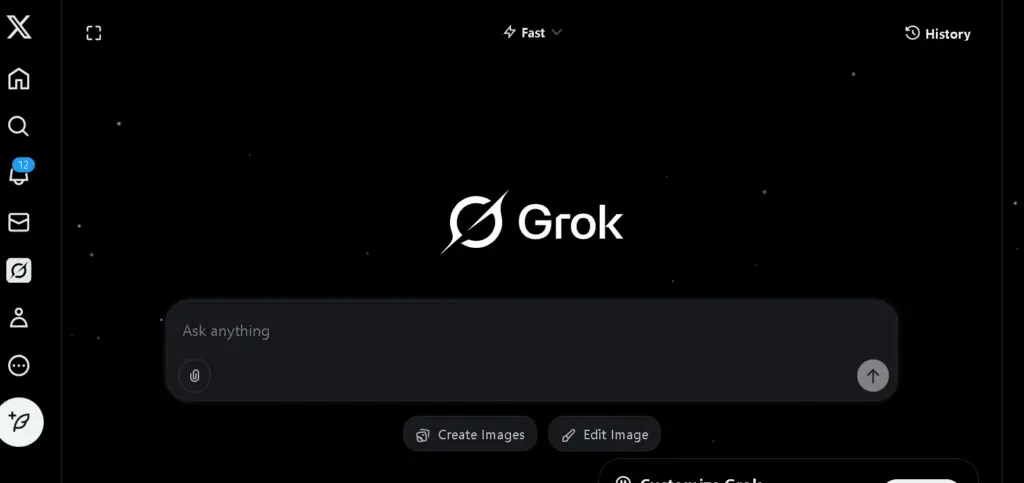
Overview
- Model Type: Grok-4 (Mixture-of-Experts, 314B parameters)
- Launched: November 4, 2023
- Created by: xAI (Elon Musk’s company)
- Web Access: Yes (via X/Twitter)
- Core Use: Real-time Q&A and entertainment with personality
Grok is Elon Musk’s conversational AI built directly into X (Twitter). Unlike Claude, which is designed for professional, structured dialogue, Grok takes a more humorous and personality-driven approach. It blends serious question answering with witty, human-like responses.
One of Grok’s standout features is its real-time integration with X, giving it instant access to live data and trending topics. It also offers two personality modes: Regular mode for standard Q&A and Fun mode for a more playful experience.
Pros
- Access to live, real-time social media data
- Distinct personality with humor
- Large 314B parameter Mixture-of-Experts model
- Fast and dynamic response generation
Cons
- Less structured than Claude for detailed writing tasks
- Currently limited to Premium+ users on X
Pricing
- Available with X Premium+ subscription for $16/month
- More features and regions are expected as rollout expands
11. Copy.ai
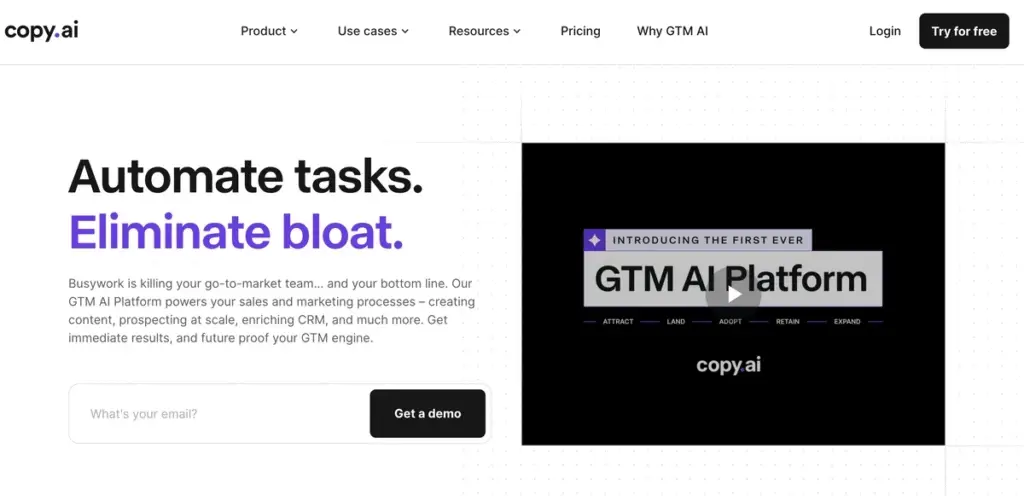
Overview
- Model Type: Mix of ChatGPT 3.5, Claude 3, and proprietary models
- Launched: October 15, 2020
- Created by: Copy.ai (Paul Yacoubian)
- Web Access: Yes
- Core Use: Copywriting, marketing, and sales content generation
Copy.ai is designed with marketing and sales teams in mind, making it a top alternative to Claude for business-related writing. The platform comes with over 200+ prebuilt workflows and templates, allowing users to generate blog posts, landing pages, sales scripts, and ad copy in minutes.
Unlike Claude, which is more general-purpose, Copy.ai doubles as a marketing and sales operating system, helping go-to-market teams automate campaigns. Its brand voice customization ensures that all generated content stays consistent across different platforms and campaigns.
Pros
- 200+ templates and workflows for fast content creation
- Brand voice customization for consistent tone
- Team collaboration features for marketing workflows
Cons
- Can be slower on complex content tasks
- Less conversational flexibility than Claude
Pricing
- Free Plan: Up to 2,000 words/month with access to GPT-3.5 and Claude 3
- Pro Plan: $49/month – unlimited credits, all models, and premium support
- Enterprise Plan: $249/month – advanced features, custom workflows, and team seats
12. Meta AI
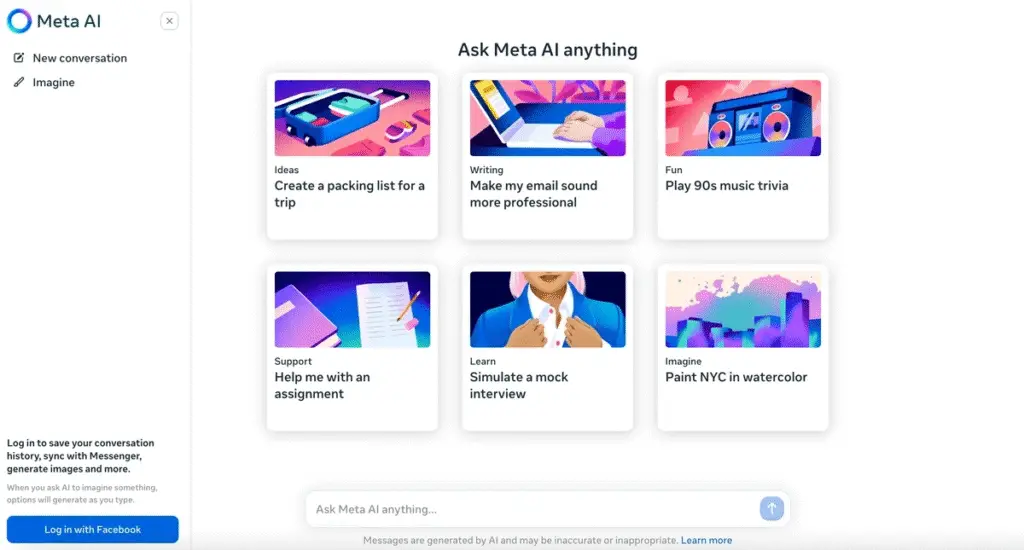
Overview
- Model Type: Meta LLaMA 4
- Launched: April 18, 2024
- Created by: Meta Platforms (Facebook)
- Web Access: Yes
- Core Use: AI assistance across Meta’s apps (Facebook, WhatsApp, Instagram, Messenger, VR devices)
Meta AI, powered by LLaMA 4, is a versatile Claude alternative built directly into Meta’s ecosystem. Its biggest strength is seamless availability—you can interact with Meta AI while messaging friends on WhatsApp, posting on Instagram, or using VR devices like the Oculus headset or Ray-Ban Meta smart glasses.
Unlike Claude, which focuses heavily on professional and creative writing, Meta AI thrives in social contexts. It can answer queries, generate captions, and even create images. With real-time internet access, Meta AI stays updated on trends, making it ideal for social media users.
Pros
- Free to use across Facebook, Instagram, WhatsApp, and Messenger
- Multimodal: supports both text and image generation
- Real-time internet connectivity
- Works with VR and wearable devices
Cons
- Less effective for coding or technical content
- Heavily tied to Meta’s ecosystem
Pricing
Meta AI is completely free. Anyone with a Facebook account can use it across all Meta apps and devices.
13. Character.ai
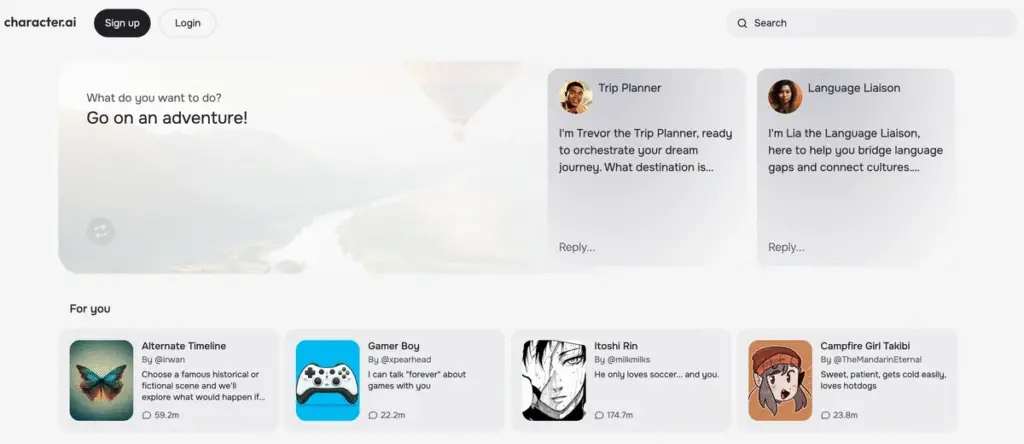
Overview
- Model Type: C1.2 Large Language Model
- Launched: September 16, 2022
- Created by: Character Technologies, Inc.
- Web Access: Yes
- Core Use: Role-playing, interactive storytelling, and entertainment
Character.ai takes a creative-first approach to AI by offering millions of AI-generated characters you can chat with. These characters include celebrities, fictional figures, religious icons, or even user-created personas. Unlike Claude, which is optimized for reasoning and professional writing, Character.ai focuses on immersion and entertainment.
Each character remembers past conversations, making interactions feel natural and dynamic. The platform is highly customizable, allowing users to build and share their own AI characters. In 2023, Character.ai was even crowned Google Play’s AI App of the Year, reflecting its popularity in the entertainment space.
Pros
- Immersive role-playing with lifelike AI characters
- Memory retention for dynamic conversations
- Supports multi-character chats
- Free to use with millions of characters available
Cons
- Limited to creative/entertainment use cases
- Inconsistent quality depending on the character
Pricing
- Free Plan: Full access with slower response times
- C.AI+ Plan: $9.99/month for faster replies and early access to new features
14. DeepAI
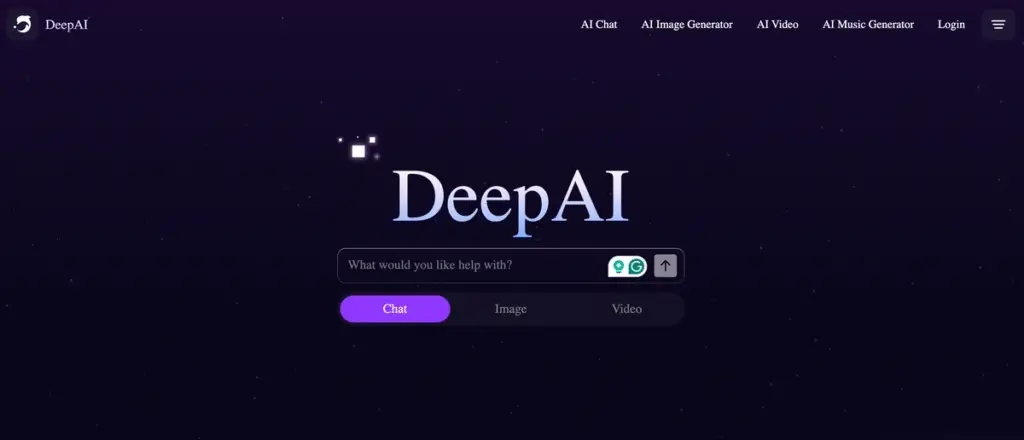
Overview
- Model Type: Proprietary GPT-based models
- Launched: April 2017
- Created by: DeepAI Inc.
- Web Access: Yes
- Core Use: Low-cost AI for text, image, and video generation
DeepAI is a budget-friendly AI toolbox offering everything from chatbots to image, video, and music generators. While Claude emphasizes creativity and structured reasoning, DeepAI focuses on providing affordable and accessible AI services.
The chatbot can access the web for fact-checking, and premium users unlock “Genius Mode”, which improves reasoning, accuracy, and creativity. Developers can also integrate DeepAI’s models through an API, making it a practical option for startups and small businesses.
Pros
- Wide suite of AI tools (text, image, video, music)
- API support for developers
- “Genius Mode” boosts output quality
- Very affordable entry plans
Cons
- Free version is very limited
- Lower quality compared to premium models like Claude or Gemini
Pricing
- Free Plan: Basic access with limited features
- Pay-as-you-go: From $5/month (350 messages included)
- DeepAI Pro: $4.99/month + usage fees (1,750 messages/month included)
15. Rytr
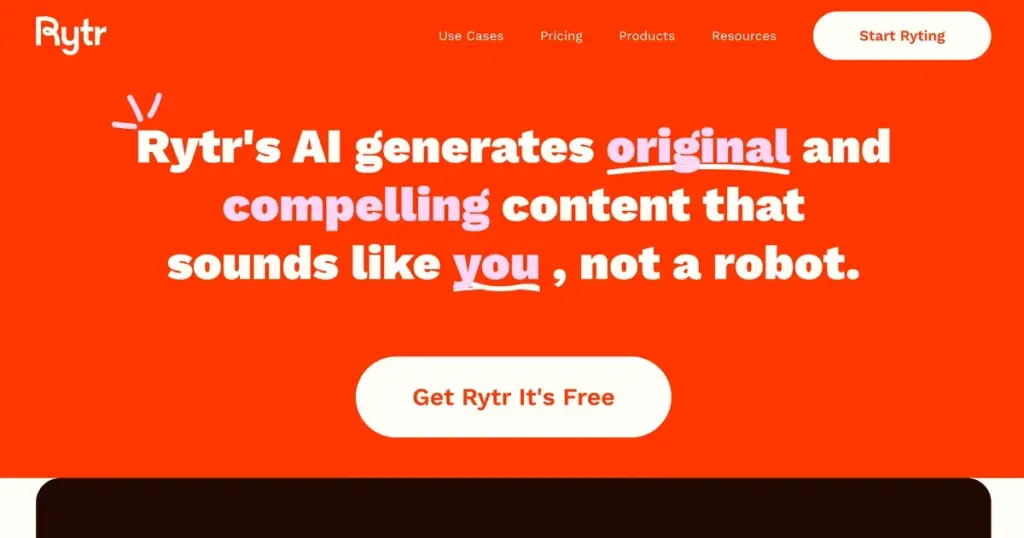
Overview
- Model Type: GPT-3 based models
- Launched: April 2021
- Created by: Rytr LLC
- Web Access: Yes
- Core Use: Blog posts, ads, product descriptions, and SEO content
Rytr is a lightweight, affordable writing assistant designed for freelancers, marketers, and small businesses. While Claude offers advanced reasoning and creativity, Rytr’s strength is in speed and cost-effectiveness.
Its standout feature, My Voice, learns from your past writing samples to generate content that matches your brand tone. Combined with SEO tools, plagiarism checks, and multilingual support (35+ languages), Rytr helps users produce consistent and optimized content at scale.
Pros
- SEO tools built-in for content optimization
- My Voice feature maintains brand identity
- Templates for blogs, ads, and product copy
- Multilingual support (35+ languages)
Cons
- Based on older GPT models (less advanced than Claude)
- Free plan very limited
Pricing
- Free Plan: 10,000 characters/month
- Saver Plan: $9/month – unlimited characters, 1 voice tone, 50 plagiarism checks
- Premium Plan: $29/month – multiple tones, 100 checks, 35+ languages
16. Anyword
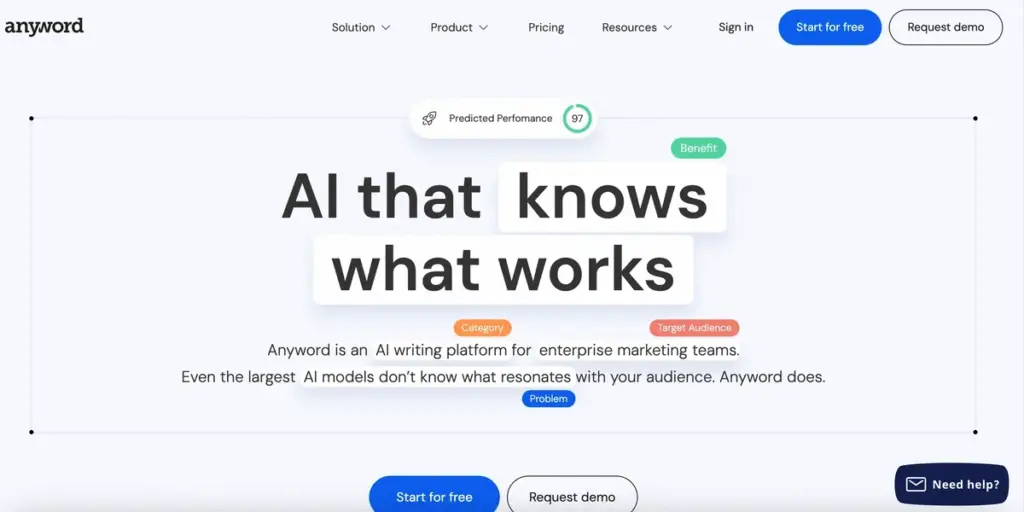
Anyword Overview
- Language model: Hybrid of GPT-3, T5, CTRL, and fine-tuned proprietary models
- Internet access: Yes
- Purpose: AI-powered marketing and advertising content creation
- Launch date: 2013 (as Keywee Inc., rebranded in 2021)
- Creator: Keywee Inc.
Anyword is an AI copywriting platform designed specifically for marketing professionals. Unlike general-purpose AI tools like Claude, Anyword specializes in producing high-converting performance marketing content such as ads, landing pages, emails, and social posts.
Its standout feature is predictive performance scoring, which evaluates how well the generated content is likely to perform before publishing. Users can train Anyword’s AI on their brand’s data to maintain consistency and even integrate it with third-party marketing platforms.
Pros
- Generates multiple types of marketing assets
- Predictive analytics for content performance
- Supports brand-specific voice training
Cons
- Struggles with long-form originality
Pricing
No permanent free plan is offered. Pricing begins at $49/month with a 7-day free trial, covering one brand voice and unlimited content. Team and enterprise plans range from $99/month to $499/month, depending on the number of seats and content assets required.
17. QuillBot
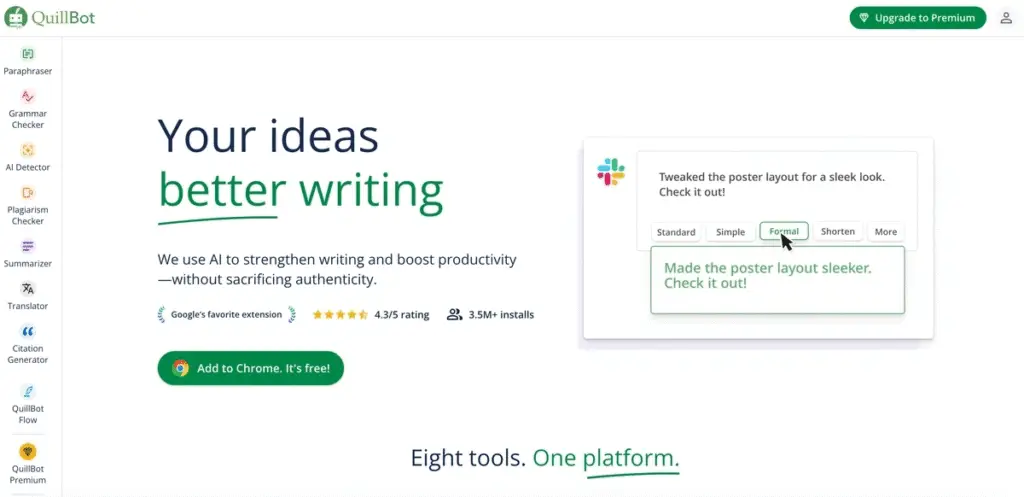
QuillBot Overview
- Language model: Proprietary AI trained on text and code data
- Internet access: Yes
- Purpose: Writing enhancement and paraphrasing tool
- Launch date: December 2017
- Creator: QuillBot, Inc.
QuillBot is one of the most popular AI-powered paraphrasing and writing improvement tools. While Claude can generate natural and creative text, QuillBot is designed to refine, restructure, and simplify writing through eight powerful tools, including a paraphraser, grammar checker, summarizer, and citation generator.
The paraphrasing feature offers multiple rewriting modes (Fluency, Standard, Formal, Creative, Expand, Shorten, etc.), giving users complete control over how text is restructured.
Pros
- Free plan with basic features
- Multiple paraphrasing modes for flexibility
- Easy integrations with Chrome, Word, and Google Docs
- Simple and user-friendly
Cons
- Limited creativity compared to AI writers like Claude
Pricing
The free version allows paraphrasing up to 125 words and summarizing up to 1,200 words. The Premium Plan starts at $19.95/month or $99.95 annually, unlocking unlimited word limits and advanced features.
18. Codeium
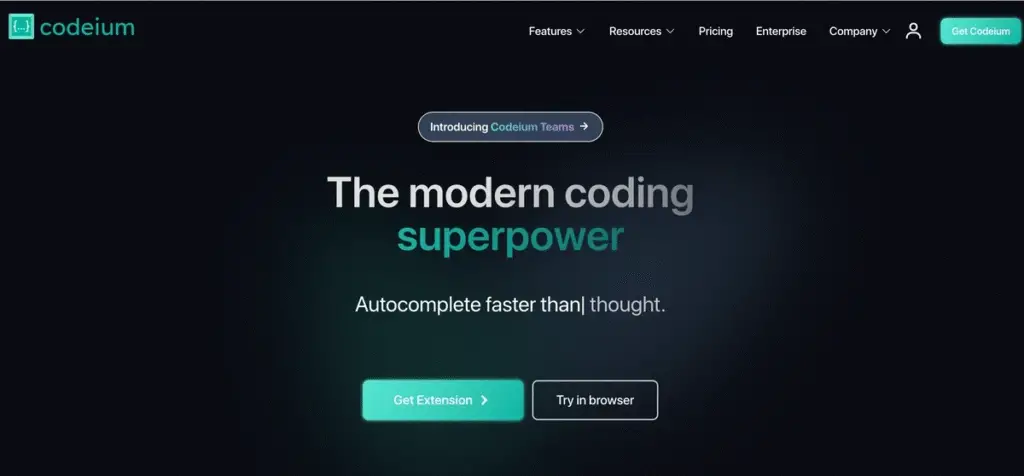
Codeium Overview
- Language model: Proprietary models + GPT-4
- Internet access: Yes
- Purpose: Boost developer productivity with AI coding features
- Launch date: October 28, 2022
- Creator: Exafunction, Inc.
Codeium is a specialized AI coding assistant that enhances developer workflows by providing real-time code completions, intelligent search, and AI-powered explanations. Unlike Claude, which can write code but isn’t fully optimized for developers, Codeium is built for seamless integration into IDEs like VS Code, JetBrains, and more.
Supporting over 70 programming languages and 40+ IDEs, it provides context-aware suggestions and a conversational AI assistant directly in the editor. Developers often rely on its code search and debugging support to streamline their workflow.
Pros
- Supports 70+ languages and 40+ IDEs
- Contextual, accurate code completions
- Customizable for personal coding style
- Many free features compared to competitors
Cons
- Debugging abilities could be stronger
Pricing
The Individual Plan is free forever, offering unlimited code suggestions and AI chat. Teams requiring advanced features (like dashboards, admin tools, and personalization) can upgrade starting at $12/seat/month, scaling up to 200 seats.
Conclusion
Claude remains unique because of its constitutional AI framework, which emphasizes safety and ethical use while limiting web access. However, depending on your needs, several alternatives can outperform Claude in specialized areas:
- Anyword excels in performance-driven marketing content.
- QuillBot is unmatched for paraphrasing and writing refinement.
- Codeium is purpose-built for developers and coding workflows.
Each tool brings its own strengths, making them worthwhile alternatives for users seeking features beyond Claude’s capabilities.
Read Also:

